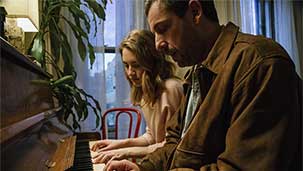There are a lot of lessons to be learned from the editing in The Meyerowitz Stories (New and Selected). I hope you were taking notes. We wrote your boss, Jennifer Lame, last year to compliment her stellar work on Manchester By The Sea. She’s been busy, didn’t write back, no big deal. But I’m curious if you had the same major takeaways that I did after finishing Noah Baumbach’s new film.
The standout editing technique here, of course, is the hilarious tactic of cutting main characters off mid-sentence. Watching Adam Sandler, for example, wind up for one of his classic man-child tantrums, only to smash cut into a tranquil art gallery, or calm conversation later in the day is both ingenious and wildly refreshing. Baumbach’s films tend to live and die by the strength of their interpersonal character dynamics (like the richly engrossing The Squid and the Whale, or the forgettably meandering Greenberg), so escaping the moments of high drama from big movie stars seems counter-intuitive - especially when you’re working on the canvas of an indie drama. But we’ve seen it all before, and unless this argument is the final straw between characters, it’s just another bump on the road. Family squabbles can flare up in a flash and dissipate just as quickly, but I don’t think I’ve ever seen this dynamic expressed so efficiently on film.
Another useful lesson, though probably for different reasons, is what chapter headings bring to a story. I have little doubt that these inserts come directly from the script, since they seem to be the only real justification for the film’s literary inspired title. But while they didn’t ruin the film, they certainly didn’t add much to the experience either. It’s one of those net neutral additions requested by a director that you will no doubt encounter in your future career as an editor. And in this case, the appropriate response was probably, “sure”. They don’t hurt, but they don’t really help the film’s already chronological structure and classically designed introduction of characters (who are all directly connected anyway).
Beyond those stand-out editing techniques, however, were a litany of smaller but arguably more crucial decisions of how much to keep, how much to cut, what reactions to use, and all the frame-by-frame minutiae that feels insignificant in the moment but can add up to a dramatically different viewing experience. Allowing actors like Dustin Hoffman, Ben Stiller, Emma Thompson and others be loose on set has advantages, but only if someone on the back-end can sculpt them into concise versions of what the actors themselves hoped to accomplish. And in this case, it works. We understand all too well the tense relationship between half-siblings fighting for their father’s affection. And we get a good enough sense of their dynamic to understand why final decisions are larger than what might come across on the page alone.
In the end, that’s exactly your job (unless of course you’re the same Sam Levy who usually shoots all of Noam Baumbach’s films. No? Yes? A son maybe? The latter would be pretty much perfect).
Sincerely,

Christopher







